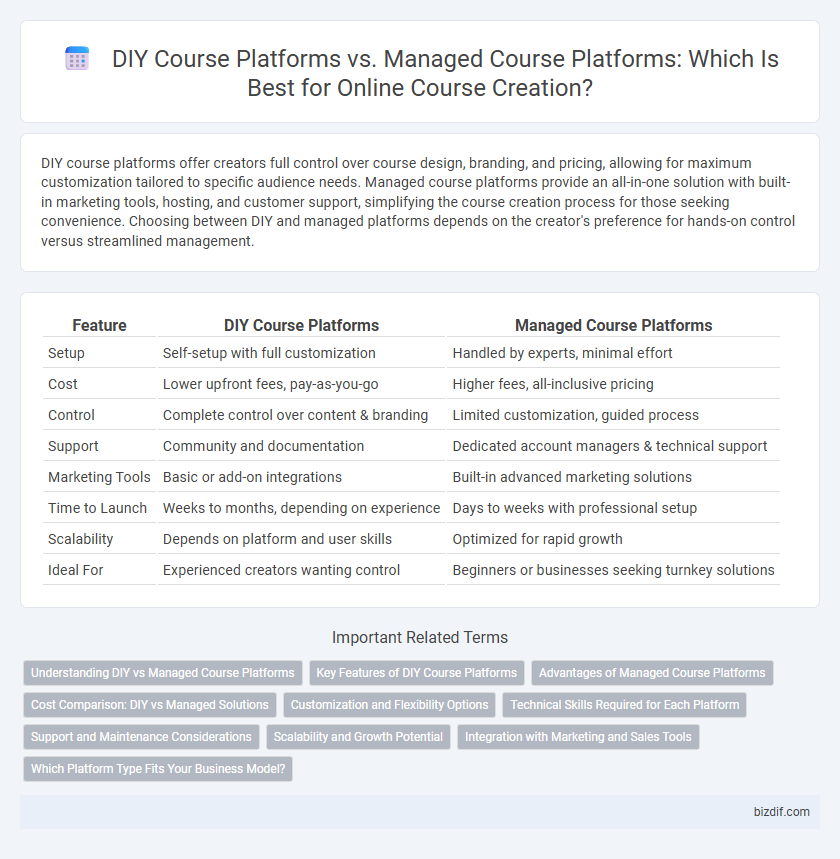DIY course platforms offer creators full control over course design, branding, and pricing, allowing for maximum customization tailored to specific audience needs. Managed course platforms provide an all-in-one solution with built-in marketing tools, hosting, and customer support, simplifying the course creation process for those seeking convenience. Choosing between DIY and managed platforms depends on the creator's preference for hands-on control versus streamlined management.
Table of Comparison
| Feature | DIY Course Platforms | Managed Course Platforms |
|---|---|---|
| Setup | Self-setup with full customization | Handled by experts, minimal effort |
| Cost | Lower upfront fees, pay-as-you-go | Higher fees, all-inclusive pricing |
| Control | Complete control over content & branding | Limited customization, guided process |
| Support | Community and documentation | Dedicated account managers & technical support |
| Marketing Tools | Basic or add-on integrations | Built-in advanced marketing solutions |
| Time to Launch | Weeks to months, depending on experience | Days to weeks with professional setup |
| Scalability | Depends on platform and user skills | Optimized for rapid growth |
| Ideal For | Experienced creators wanting control | Beginners or businesses seeking turnkey solutions |
Understanding DIY vs Managed Course Platforms
DIY course platforms offer creators full control over course design, content management, and pricing but require technical skills for setup and maintenance. Managed course platforms handle hosting, marketing, payment processing, and customer support, allowing instructors to focus on content creation without technical hassles. Choosing between DIY and managed platforms depends on the creator's expertise, desired control level, and time investment for course management.
Key Features of DIY Course Platforms
DIY course platforms offer users full control over course design, content customization, and branding without needing advanced technical skills. Key features include drag-and-drop builders, customizable templates, integrated multimedia support, and flexible pricing options to maximize course creator independence. These platforms often provide detailed analytics and marketing tools to help creators optimize engagement and revenue.
Advantages of Managed Course Platforms
Managed course platforms offer comprehensive technical support, reducing the need for user-side troubleshooting and platform maintenance. They provide integrated marketing tools, analytics, and payment processing, streamlining course delivery and student management. These platforms ensure scalability and security with automated updates and compliance, allowing creators to focus on content quality and learner engagement.
Cost Comparison: DIY vs Managed Solutions
DIY course platforms generally incur lower upfront costs, requiring users to pay for software subscriptions and hosting while retaining full control over content and design. Managed course platforms include higher fees, often encompassing hosting, customer support, and integrated marketing tools, which streamline course delivery but increase overall expenses. Analyzing long-term scalability and additional feature costs is crucial for selecting the most cost-effective course creation solution.
Customization and Flexibility Options
DIY course platforms offer extensive customization and flexibility options, allowing creators to design courses tailored to their unique branding and instructional style, with control over layout, content, and integrations. Managed course platforms provide streamlined setup and support but often limit customization to predefined templates and features, restricting flexibility in course design and user experience. Choosing between DIY and managed platforms depends on the priority given to hands-on personalization versus convenience and technical assistance.
Technical Skills Required for Each Platform
DIY course platforms require creators to possess technical skills such as website design, content integration, payment gateway setup, and troubleshooting common software issues. Managed course platforms offer a streamlined experience by handling backend technology, allowing educators to focus on course content without deep technical knowledge. Understanding the technical demands of each platform helps course creators select the best fit for their skill level and resource availability.
Support and Maintenance Considerations
DIY course platforms require users to handle technical support, software updates, and troubleshooting independently, which can be time-consuming and require technical skills. Managed course platforms provide dedicated support teams and automatic maintenance, ensuring seamless operation and reducing downtime. Choosing between these options depends on your capacity to manage technology versus the need for professional assistance and reliability.
Scalability and Growth Potential
DIY course platforms offer greater scalability by allowing creators to customize and integrate various tools tailored to their audience's needs, facilitating organic growth and expanded course offerings. Managed course platforms streamline the growth process through built-in marketing features and technical support, enabling faster audience reach but often limiting advanced customization and scalability options. Choosing between the two depends on prioritizing control and flexibility versus ease of growth and operational assistance in online course creation.
Integration with Marketing and Sales Tools
DIY course platforms often require manual setup and third-party integrations to connect with marketing and sales tools, which can lead to inconsistent data flow and increased management time. Managed course platforms provide seamless, built-in integration with CRM, email marketing, and payment gateways, enhancing lead tracking, automated sales funnels, and overall customer journey optimization. Choosing a managed platform typically results in more efficient marketing automation and higher conversion rates due to its cohesive ecosystem.
Which Platform Type Fits Your Business Model?
DIY course platforms offer extensive customization and control, ideal for businesses with existing technical expertise and a desire to tailor every aspect of their online courses. Managed course platforms provide comprehensive support and streamlined setup, making them suitable for entrepreneurs prioritizing ease of use and quick launch without in-depth technical involvement. Businesses focused on scalability and branding flexibility typically benefit from DIY platforms, while those valuing convenience and ongoing management prefer managed solutions.
DIY course platforms vs Managed course platforms Infographic

 bizdif.com
bizdif.com